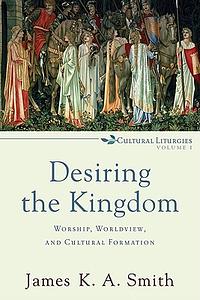You need to sign in or sign up before continuing.
Take a photo of a barcode or cover
This book was really helpful and one of my favorite readings for class.
Everything is formational. Jamie Smith explains how we are, by nature, desiring beings formed by all our practices. He advocates for thoughtful practices that form us spiritually instead of the more common shallow practices of developing a Christian worldview. He even suggests "worldview talk" waters down the radical nature of the gospel. I love these beliefs and the perspective shift from developing Christian worldview to actual spiritual formation.
Though, there were many good things about this book, I could not get past the minimal exposition of Scripture in a book that so heavily emphasized spiritual formation. If we are being formed by holy, liturgical, historically-Christian practices, but not being formed by God Himself or the manifestation of His truth in Scripture, we are not being made like Christ. I wish Smith had offered more biblical support for the sacred liturgies he champions.
Despite my criticism, I still deeply value this book. It prompted thoughtful reflection on the purpose of Christian higher education and the ways the patterns of our days shape our lives.
Everything is formational. Jamie Smith explains how we are, by nature, desiring beings formed by all our practices. He advocates for thoughtful practices that form us spiritually instead of the more common shallow practices of developing a Christian worldview. He even suggests "worldview talk" waters down the radical nature of the gospel. I love these beliefs and the perspective shift from developing Christian worldview to actual spiritual formation.
Though, there were many good things about this book, I could not get past the minimal exposition of Scripture in a book that so heavily emphasized spiritual formation. If we are being formed by holy, liturgical, historically-Christian practices, but not being formed by God Himself or the manifestation of His truth in Scripture, we are not being made like Christ. I wish Smith had offered more biblical support for the sacred liturgies he champions.
Despite my criticism, I still deeply value this book. It prompted thoughtful reflection on the purpose of Christian higher education and the ways the patterns of our days shape our lives.
Has a mild case of "Your manuscript is too short. Make it longer. -I said all I need to say. -Nope. Gotta be 230p to sell. Repeat yourself 'til it's long enough." but aside from that, it's all pretty necessary reading.
Seems repetitive
I liked this book and admire Smith's thoughts on love, the church, and “liturgy of the mall” notion. However I’ve read Smith before and I felt like I was rereading a book I already read but I wasn’t and I checked twice while reading this.
I liked this book and admire Smith's thoughts on love, the church, and “liturgy of the mall” notion. However I’ve read Smith before and I felt like I was rereading a book I already read but I wasn’t and I checked twice while reading this.
informative
inspiring
reflective
slow-paced
challenging
informative
reflective
slow-paced
One of my favorite social-theological texts; has shaped the way I think about liturgy, consumerism, nationalism, politics, and how all of this relates to worship.
Only James K.A. Smith would try and succeed in doing so many things in one book. Smith argues that humans are not primarily 'thinking animals', but 'desiring animals.' This shift in theological anthropology helps Smith re-envision worship as a full-bodied experience as well as re-envision education as appeal to the whole of the person (not simply cramming information into their brain). Overall, I highly recommend this for any one who wants to take seriously the call to worship and influence the culture around them.



